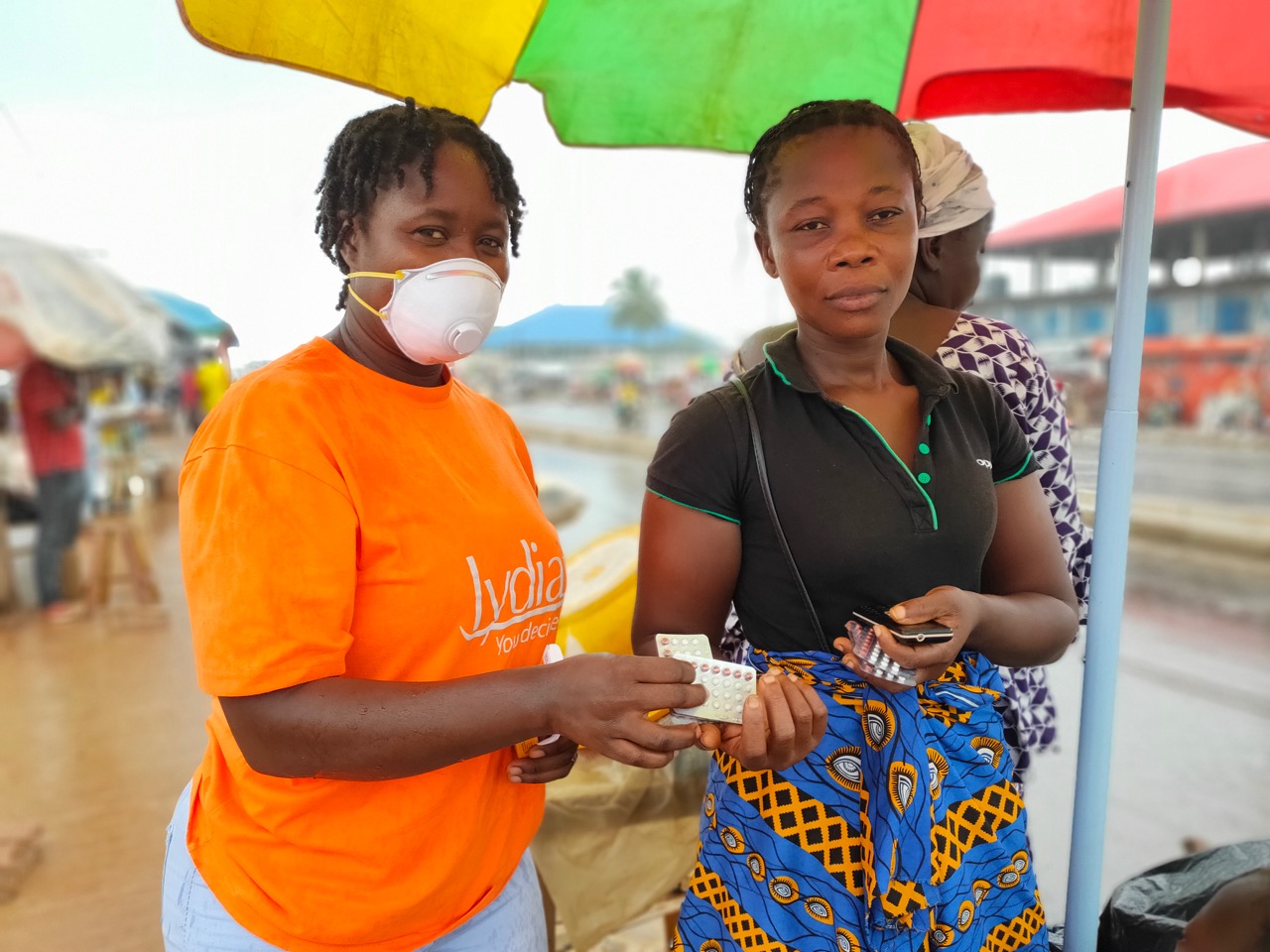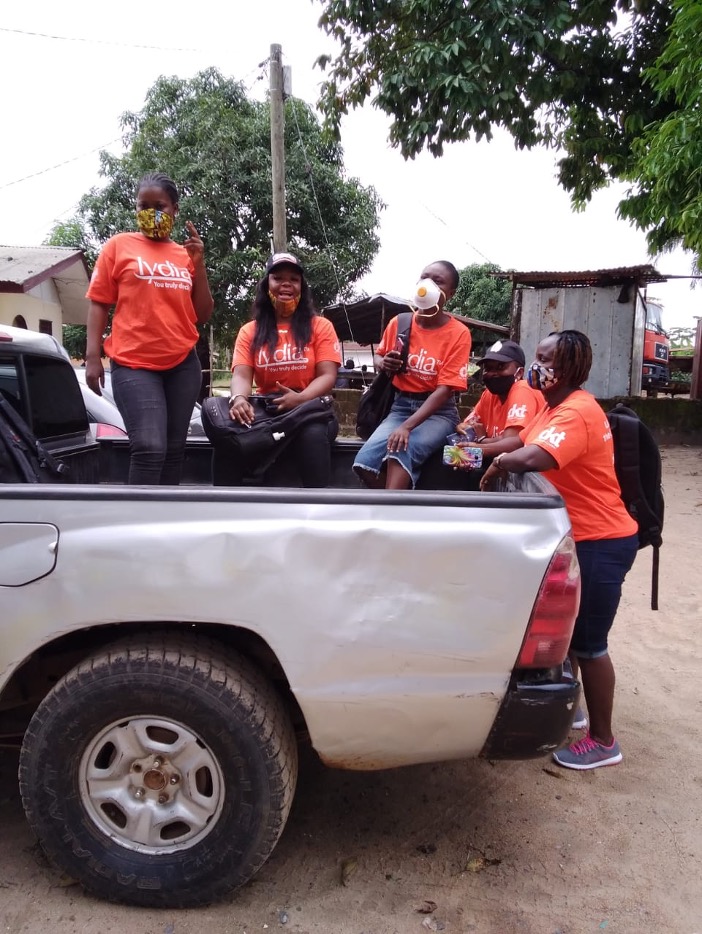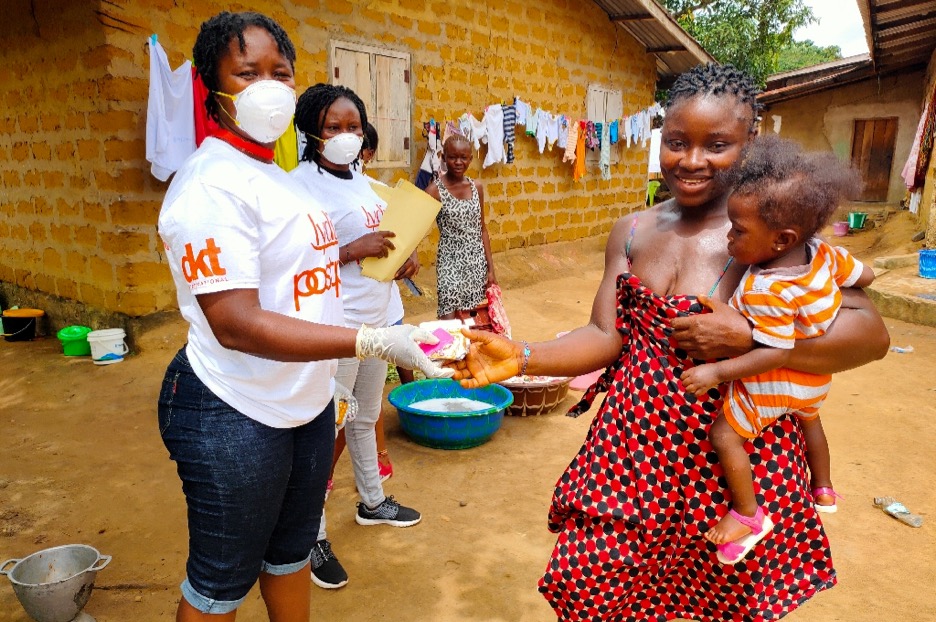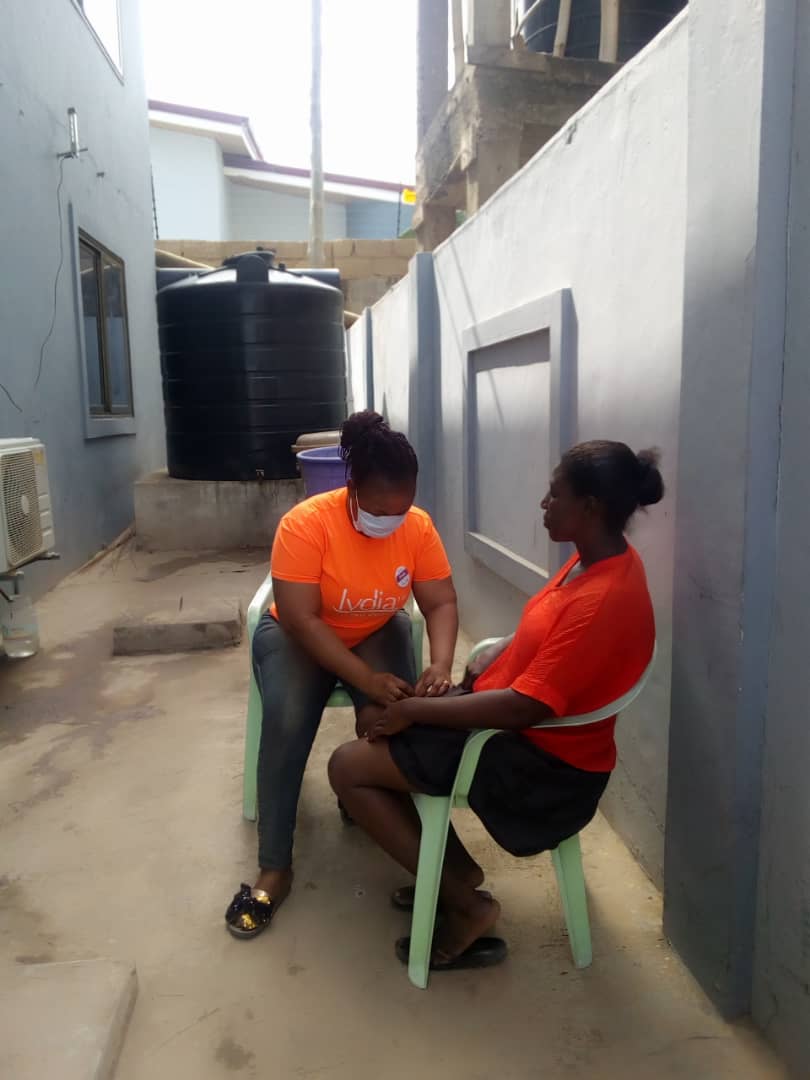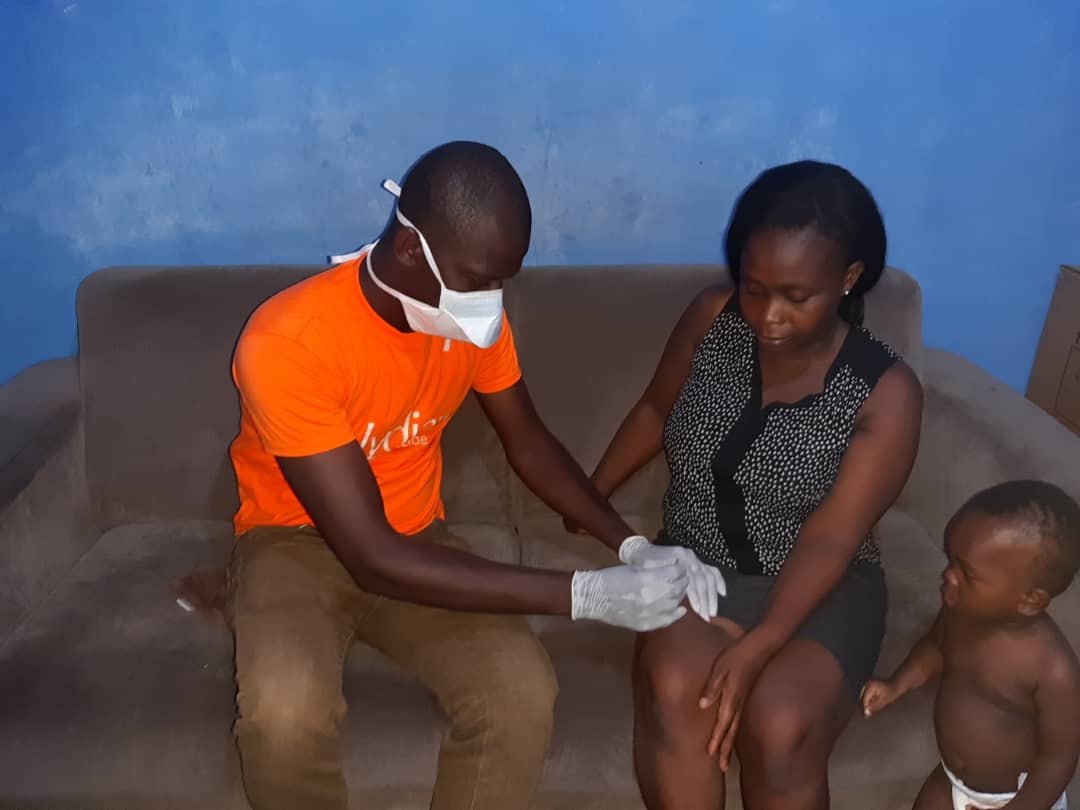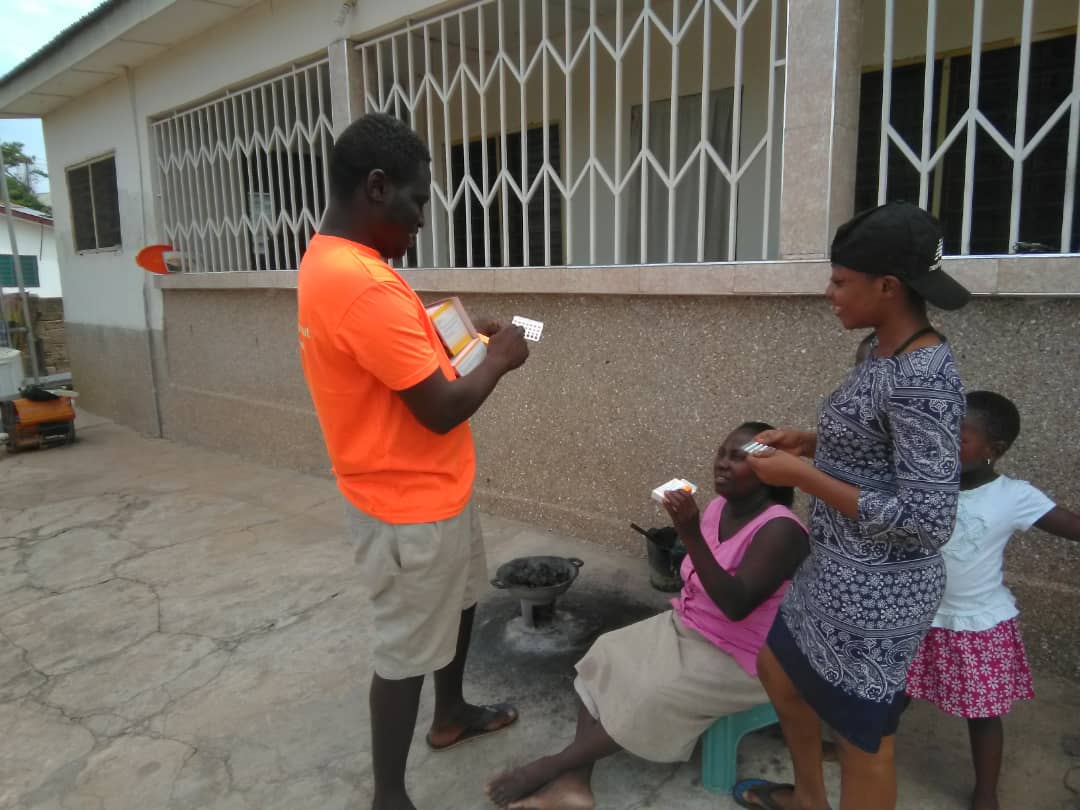
View the PDF here.
Liberia
The economic impact of COVID led DKT Liberia to reevaluate its product pricing strategy for oral contraceptives. DKT Liberia, like all other DKT programs, operates under the assumption that selling affordable products through the private sector affords men and women the agency to opt for the contraception of their choice. The strategy is thought to develop the contraceptive market and foster brand, or method, loyalty.
However, with the public’s purchasing power endangered by the pandemic, DKT Liberia opted to offer six-months’ of its Lydia Daily oral contraceptives (OC) free-of-charge via home-delivery, a move sure to reduce the financial burden of family planning and mitigate COVID risks, all without sacrificing DKT’s sustainability.
The free OC program was carried out by DKT’s team of health entrepreneurs, County Community Representatives (CCRs). who piloted the initiative in select districts: Paynesville, Barnesville, and Brewerville. CCRs’ role in the program extended beyond delivery, having the additional responsibility of educating clients about OC at socially-distanced community events, advertised on the Truth FM radio station in advance.
DKT felt that, in spite of the inevitable risk of group gatherings, these informational events were necessitated by the public’s general unfamiliarity with OC. Indeed, four of DKT’s CCRs, Alvie Z. Moore, Ata Midzrato, Princess Green, and Lucy George, described their experiences debunking clients’ myths, all while social distancing. One 14-year-old client, the CCRs explained, had been taking two oral contraceptive pills each day, as instructed by her mother. The CCRs corrected her mistake.
“Even with six feet between us, she was still able to take away an important lesson about her birth control method.”
In addition to opportunities for education, the program’s home-delivery component helped alleviate clients’ concerns about entering healthcare facilities.
According to CCRs, some 40% of those six-month supplies recipients had never used OC in the past, suggesting this program has addressed clients’ need during COVID all while motivating dozens of new contraceptive users.
DKT’s CCRs increased the chance of these new users’ contraceptive continuity by collecting clients’ information using an SMS program to send automated reminders for OC refills. CCRs made explicit effort to explain that, prior to the pandemic.
Lydia Daily pills were not free-of-charge and, following their six months supply, they should expect to purchase packs at local pharmacies for as 120 Liberian Dollars ($0.60 USD). DKT’s monitoring and evaluation department will assess clients’ willingness to continue with the method in six months and, if clients prefer to switch to a longer-term alternative, DKT will refer them to a local Lydia Partner Clinic.
In addition to OC, DKT’s CCRs offered vital information about long-term alternatives, referrals to Lydia Partner Clinics equipped with sanitizer and hand-washing stations, and basic information on COVID. Alvie, Ata, Princess, and Lucy recalled one woman who mistakenly thought DKT’s OC was a preventative treatment for COVID. The four shut down the misunderstanding and took the opportunity to explain the unfortunate news that, at the moment no such treatment exists. DKT feels responsible for sharing reliable information on contraception and COVID to its community, a role from which we refuse to surrender during the pandemic.
Sierra Leone
Travel restrictions enforced to curb the spread of the virus have had unintended effects on distribution and supply chains worldwide. Sierra Leone has been no exception; in March, the government rolled out a number of policies barring cross-province travel and daily curfews. DKT Sierra Leone adapted to the new landscape by distributing products to seven wholesalers from which retail outlets inaccessible to DKT sales teams could procure stock. DKT had considered employing a similar distribution model prior to the pandemic, but the virus proved to be an important moment to test the strategy, innovation as the only means to sustain contraceptive access.
Once DKT received special government permissions to distribute and travel, within certain conditions, DKT hoped these seven wholesalers would retain stock levels; meanwhile, DKT’s sales team visited harder-to-reach, rural areas during their regularly scheduled monthly trips.
After two months testing this strategy, four of the seven wholesalers committed to continuing their role, having benefited from the business themselves. The four, located in Kabala, Makeni, Bo, and Pujehun, have contributed to what appears to be an increase in the number of DKT products stocked at various outlets.
DKT ensured each wholesaler was stocked with some of its slower performers, including HIV self-test kits, Lydia Daily oral contraceptives, and new Fiesta condom variants. Since these wholesalers work closely with their clientele outlets, many are more willing to accept additions to their SRH portfolio.
Clients’ willingness to accept new products suggests DKT’s has successfully developed the contraceptive market. One of DKT Sierra Leone’s greatest challenges has been the public’s staunch loyalty for a select number of products. Clients have been especially hesitant to adopt DKT’s OC brand, which has not yet built a following. However, the increasing number of DKT products in-stock, even during COVID, suggests DKT’s new distribution model was a risk worth taking.
Ghana
The pandemic has hiccuped the momentum of DKT Ghana’s team of health entrepreneurs, Regional Community Representatives (RCR), who, like their Liberian colleagues, educate communities and refer women to local Lydia Partner Clinics. The pandemic and Ghana’s political response has barred RCRs from hosting large educational gatherings. Just as well, many Ghanaian women are hesitant to enter Lydia Partner Clinics in fear of COVID, unwilling to take one health risk in light of another.
To reverse this COVID-caused trend, DKT’s RCRs worked closely with the health providers from nine Lydia Partner Clinics during March and April to identify clients interested in contraception and offer at-home client services in Accra, Kumasi, Tamale, and Brong Ahafo.
These providers offer nearly DKT’s full product portfolio during house calls: emergency contraceptives, implants, IUDs, DMPA-SC, and various other injectables. Clients were identified in part by RCRs and, in the majority of cases, using Lydia Partner Clinic records, which track who is due for a follow-up and when.
DKT’s close monitoring of the Partner Clinics’ client intake, which has been improved and even streamlined during COVID, has proven itself one of DKT’s most important assets to contraceptive continuity. In just the first week of the at-home program, DKT’s partner providers tended to 91 clients. By the end of the first month, providers administered 191 DMPA-SC injections, 30 implant and 7 IUD insertions, and 16 had been equipped with the information and product to self-administer DMPA-SC for the coming months.
Freda and Cecilia, two midwives from the Lydia Partner Clinics, observed two major trends from the program. On the one hand, clients have been more motivated than ever to adopt long-term methods at home, eliminating the need to enter healthcare facilities for the foreseeable future. One of their happiest clients in Kumasi, the two reported, had used Depo-Provera injectables for months before ultimately receiving a Jadelle implant in the comfort of her own home.
In contrast, however, the at-home service model has not eliminated women’s fears of invasive insertions, leaving the vast majority to select DMPA-SC. More than ever, COVID has forced Ghanaian women (and women worldwide for that matter) to balance a number of important, contradictory decision-making factors: to prioritize COVID risk mitigation over the potential pain of a long-term method insertion; to accept a short term method that will soon require refills, in spite the pandemic’s persistence; and whether or not to accept a midwife, mask and gloves aside, into the home.
Once the lockdown was lifted, DKT worked closely with Lydia Partner Clinics to implement safety precautions and put clients at ease. By June, nearly 29,000 (85%) of clinic clients had been referred by an RCR year-to-date, setting DKT to annualize more than the effective referrals made in 2019 (50,000).
The at-home service pilot, and DKT’s efforts to return clinics to normal capacity safely, have been effective due to their client-centric focus. in April, DKT Ghana distributed PPE, hand-washing stations, and how-to-sanitize print materials to its sales and clinical partners. By June, DKT’s partner midwives began offering services at women’s businesses and market stands, symbolically, if not literally, reducing risk at home. Large Lydia banners outside clinics remind clients that their health is our greatest concern, an important reminder during such unpredictable times.
